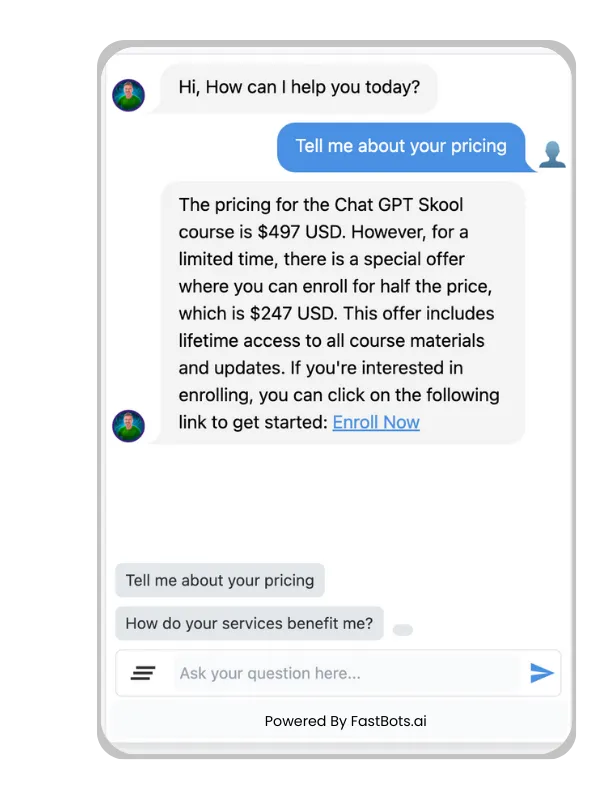WhatsApp automation marketing is transforming the way businesses communicate with their customers, offering unparalleled efficiency and improved customer experiences. By utilising the WhatsApp API, WhatsApp Business app, and chatbots, you can automate entire conversations and optimise your marketing operations. By unlocking the potential of WhatsApp automation marketing, you can significantly elevate your business's success.
One of the primary advantages of using WhatsApp automation marketing is the time-saving element. The automation process eliminates manual tasks and allows your team to focus on other critical aspects of your operations. Beyond this, automation fosters an improved customer experience by providing 24/7 support and maintaining continuous interaction with users, ensuring any concerns are addressed promptly.
However, while WhatsApp automation marketing offers extensive potential, it's essential to strike a balance between personalised outreach and respecting your customers' privacy. Understanding how to utilise these marketing tools effectively will help you cultivate lasting relationships with your clients, ultimately driving the success of your business's marketing efforts.
Essentials of WhatsApp Automation Marketing
Defining WhatsApp Automation
WhatsApp automation is a practical approach to streamlining customer communication, managing repetitive tasks, and enhancing overall customer engagement. It leverages the WhatsApp API to send predefined message templates, such as updates on orders, appointment confirmations, service requests, or payment follow-ups, to customers who have opted to receive them.
Benefits of Automation for Businesses
- 24/7 Availability: WhatsApp automation provides continuous interaction and support to users, ensuring that your business is always available to assist them.
- Increased Productivity: By reducing manual effort, you can efficiently manage a high volume of queries and tasks, enabling your team to focus on more essential aspects of the business.
- Faster Response Times: Automated messages ensure quicker customer assistance and issue resolution, leading to improved customer satisfaction.
- Consistency in Messaging: Automation maintains a consistent tone and accurate information throughout your customer interactions, building trust and reliability.
- Personalisation: Implementing WhatsApp automation enables businesses to personalise their interactions with customers. By using customer data to include variables like names or order details, you create a more engaging and tailored experience.
In summary, WhatsApp automation marketing is a powerful tool that can significantly benefit your business by streamlining communication, driving productivity, and providing personalised and efficient customer service.
BUILD YOUR OWN WHATSAPP AI CHATBOT
In less than 5 minutes, you could have an AI chatbot fully trained on your business data assisting your Website visitors.
Developing a WhatsApp Marketing Strategy
Setting Objectives
Before diving into the world of WhatsApp automation marketing, it is essential to establish clear goals. Think about what you want to achieve with your campaign, for example, increasing brand awareness, boosting customer engagement, or driving sales. Set SMART objectives (specific, measurable, achievable, relevant, and time-bound) to stay focused and measure progress accurately. Here's a quick example:
Objective: Increase customer engagement by 30% within 3 months.
Identifying the target audience
The next crucial step is to identify and segment your target audience. Understanding who your customers are will help you tailor your messaging accordingly. Start by creating customer profiles that include demographic information, preferences, behaviours, and communication styles. You may organise your audience into these categories:
1. Age Group
2. Gender
3. Location
4. Interests
For instance: Target Group: women aged 25–40, located in urban areas, interested in health and wellness.
Crafting the Message
Once you have your objectives and target audience established, it's time to craft engaging messages. Strive to create content that is relevant, helpful, and personalised. Consider the following elements when crafting your messages:
- Connect emotionally: Make your audience feel understood and cater to their needs and desires.
- Be concise: WhatsApp is a platform for quick and easy communication. Keep your message short and to the point.
- Use rich media: Incorporate images, videos, and GIFs to make your content more appealing and engaging.
- Employ personalisation: greet users by name and provide tailored deals based on their preferences.
By developing a sound WhatsApp marketing strategy that includes setting objectives, identifying your target audience, and crafting effective messages, you can unlock the potential that automation has to offer and drive your business towards greater success.
Implementing WhatsApp automation tools
Choosing the right software
When exploring WhatsApp automation for your business, it is crucial to select the appropriate software that meets your needs. Consider the following factors when evaluating options:
- Functionality: Ensure the software offers features such as scheduling messages, integrating templates, and setting up conversational flows.
- Scalability: The software should be able to cope with growing message volume as your business expands.
- Ease of use: Pick a tool with a user-friendly interface so that your team can quickly start using it.
Here are a few popular choices for WhatsApp automation software:
1. LeadSquared offers a step-by-step guide with predefined message templates for various scenarios.
2. Tidio: It enables automating WhatsApp messages and has a range of use cases and benefits.
3. Hubtype: Provides examples of how to effectively deal with customer issues through
WhatsApp automation.
Integrating with Existing Systems
It is essential to ensure seamless integration between your chosen WhatsApp automation software and your existing systems. This will enable your business to leverage the full potential of automated messaging while maintaining the cohesiveness of your workflows. Consider the following aspects:
- API integration: Select a software that provides a flexible API to connect with your existing CRM, ERP, or marketing software.
- Data synchronisation: The chosen tool should enable synchronisation of relevant customer data, interaction history, and transactional details.
- Customisation: Opt for software that allows you to customise messaging templates and workflows per your business-specific requirements.
By thoroughly assessing the available options and integrating them with your current systems, you can unlock the true potential of WhatsApp automation marketing for your business. Remember to maintain a consistent tone, provide accurate information, and target relevant customers to maximise the effectiveness of your automated messaging efforts.

Analysing and optimising campaigns
Measuring Success
To unlock success with WhatsApp automation marketing, it's essential to measure the effectiveness of your campaigns. Begin by setting specific, measurable goals and KPIs (Key Performance Indicators) that align with your objectives. Some common KPIs to track are:
- Engagement rate: Monitor the number of messages read, replies, and interactions generated by your automated messages.
- Conversion rate: Track the percentage of users who completed the desired action, such as making a purchase or signing up for a newsletter.
- ROI (Return on Investment): Calculate the net profit generated by your WhatsApp marketing efforts relative to the money spent on those campaigns.
The WhatsApp Business API can be a valuable tool for obtaining these metrics. Make use of its features to gather detailed performance data and understand how your marketing efforts are faring.
Iterative Improvements
Once you've established your KPIs, it's time to optimise your campaigns to achieve even better results. Adopt an iterative approach to continuously refine and improve your strategies. Here are a few tips:
1. A/B testing: Experiment with different components of your messages, such as copy, visuals, and call-to-action buttons. Send alternate versions to portions of your audience and evaluate which one performs better to inform future decisions.
2. Segmentation: Group your audience based on their preferences, behaviour, and demographics. Tailor your automated messages to these distinct segments, which can lead to better engagement and conversion rates.
3. Feedback and adaptation: Collect feedback from your audience to identify areas that need improvement. Make necessary adjustments to your automation workflows and message content based on this valuable input.
Remember, the key to unlocking success with WhatsApp automation marketing lies in constantly analysing and optimising your campaigns. Stay focused on data-driven decisions, and you'll be well on your way to marketing success.
Frequently Asked Questions
What are the advantages of integrating WhatsApp marketing automation into one's business strategy?
How can businesses measure the effectiveness of their WhatsApp marketing campaigns?
In what ways can WhatsApp automation be utilised to enhance customer engagement?
What steps are involved in setting up a WhatsApp automation system for marketing purposes?
1. Sign up for a WhatsApp Business API account and verify
your business.
2. Integrate your WhatsApp API with a marketing automation platform or develop your own custom integration.
3. Set up automated message templates and reply flows.
4. Define the triggers for your automation, which could include specific user actions or predefined time intervals.
5. Test your automation setup thoroughly before deploying it to your target audience.
Can WhatsApp automation support customer service operations, and if so, how?
What best practices should be followed when implementing WhatsApp marketing automation to ensure compliance with privacy regulations?
1. Obtain explicit consent from your users before adding them to your contact list or sending marketing messages.
2. Always provide an easy-to-use opt-out option for users who no longer want to receive your messages.
3. Use end-to-end encryption to ensure confidentiality and data security.
4. Regularly update your privacy policy and ensure it complies with all applicable regulations, such as GDPR.
5. Avoid spamming users with excessive or irrelevant messages by adhering to WhatsApp's guidelines and policies.
BUILD YOUR OWN WHATSAPP AI CHATBOT
In less than 5 minutes, you could have an AI chatbot fully trained on your business data assisting your Website visitors.


